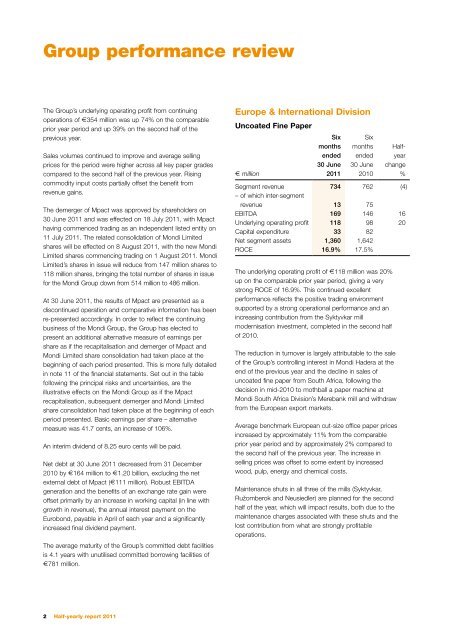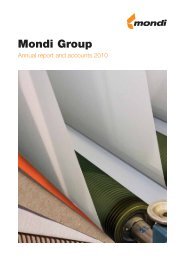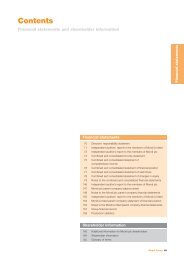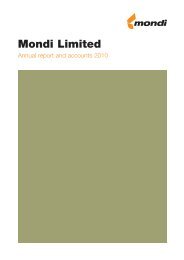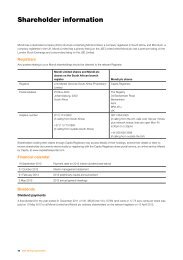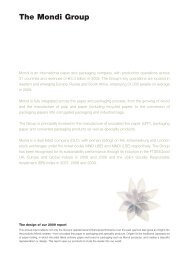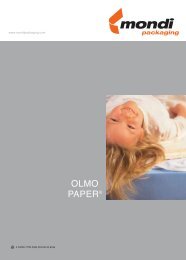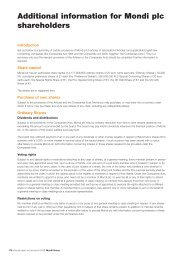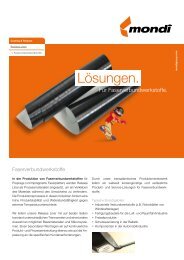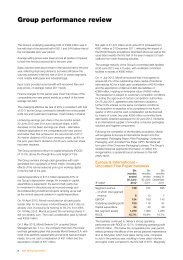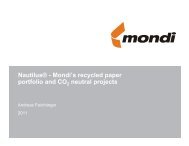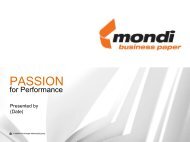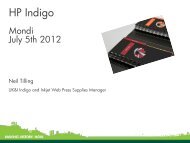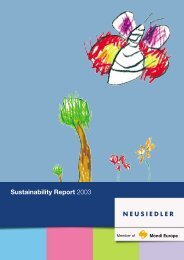Group performance review - Mondi
Group performance review - Mondi
Group performance review - Mondi
You also want an ePaper? Increase the reach of your titles
YUMPU automatically turns print PDFs into web optimized ePapers that Google loves.
<strong>Group</strong> <strong>performance</strong> <strong>review</strong><br />
The <strong>Group</strong>’s underlying operating profit from continuing<br />
operations of E354 million was up 74% on the comparable<br />
prior year period and up 39% on the second half of the<br />
previous year.<br />
Sales volumes continued to improve and average selling<br />
prices for the period were higher across all key paper grades<br />
compared to the second half of the previous year. Rising<br />
commodity input costs partially offset the benefit from<br />
revenue gains.<br />
The demerger of Mpact was approved by shareholders on<br />
30 June 2011 and was effected on 18 July 2011, with Mpact<br />
having commenced trading as an independent listed entity on<br />
11 July 2011. The related consolidation of <strong>Mondi</strong> Limited<br />
shares will be effected on 8 August 2011, with the new <strong>Mondi</strong><br />
Limited shares commencing trading on 1 August 2011. <strong>Mondi</strong><br />
Limited’s shares in issue will reduce from 147 million shares to<br />
118 million shares, bringing the total number of shares in issue<br />
for the <strong>Mondi</strong> <strong>Group</strong> down from 514 million to 486 million.<br />
At 30 June 2011, the results of Mpact are presented as a<br />
discontinued operation and comparative information has been<br />
re-presented accordingly. In order to reflect the continuing<br />
business of the <strong>Mondi</strong> <strong>Group</strong>, the <strong>Group</strong> has elected to<br />
present an additional alternative measure of earnings per<br />
share as if the recapitalisation and demerger of Mpact and<br />
<strong>Mondi</strong> Limited share consolidation had taken place at the<br />
beginning of each period presented. This is more fully detailed<br />
in note 11 of the financial statements. Set out in the table<br />
following the principal risks and uncertainties, are the<br />
illustrative effects on the <strong>Mondi</strong> <strong>Group</strong> as if the Mpact<br />
recapitalisation, subsequent demerger and <strong>Mondi</strong> Limited<br />
share consolidation had taken place at the beginning of each<br />
period presented. Basic earnings per share – alternative<br />
measure was 41.7 cents, an increase of 106%.<br />
An interim dividend of 8.25 euro cents will be paid.<br />
Net debt at 30 June 2011 decreased from 31 December<br />
2010 by E164 million to E1.20 billion, excluding the net<br />
external debt of Mpact (E111 million). Robust EBITDA<br />
generation and the benefits of an exchange rate gain were<br />
offset primarily by an increase in working capital (in line with<br />
growth in revenue), the annual interest payment on the<br />
Eurobond, payable in April of each year and a significantly<br />
increased final dividend payment.<br />
The average maturity of the <strong>Group</strong>’s committed debt facilities<br />
is 4.1 years with unutilised committed borrowing facilities of<br />
E781 million.<br />
2 Half-yearly report 2011<br />
Europe & International Division<br />
Uncoated Fine Paper<br />
E million<br />
Six<br />
months<br />
ended<br />
30 June<br />
2011<br />
Six<br />
months<br />
ended<br />
30 June<br />
2010<br />
Halfyear<br />
change<br />
%<br />
Segment revenue 734 762 (4)<br />
– of which inter-segment<br />
revenue 13 75<br />
EBITDA 169 146 16<br />
Underlying operating profit 118 98 20<br />
Capital expenditure 33 82<br />
Net segment assets 1,360 1,642<br />
ROCE 16.9% 17.5%<br />
The underlying operating profit of E118 million was 20%<br />
up on the comparable prior year period, giving a very<br />
strong ROCE of 16.9%. This continued excellent<br />
<strong>performance</strong> reflects the positive trading environment<br />
supported by a strong operational <strong>performance</strong> and an<br />
increasing contribution from the Syktyvkar mill<br />
modernisation investment, completed in the second half<br />
of 2010.<br />
The reduction in turnover is largely attributable to the sale<br />
of the <strong>Group</strong>’s controlling interest in <strong>Mondi</strong> Hadera at the<br />
end of the previous year and the decline in sales of<br />
uncoated fine paper from South Africa, following the<br />
decision in mid-2010 to mothball a paper machine at<br />
<strong>Mondi</strong> South Africa Division’s Merebank mill and withdraw<br />
from the European export markets.<br />
Average benchmark European cut-size office paper prices<br />
increased by approximately 11% from the comparable<br />
prior year period and by approximately 2% compared to<br />
the second half of the previous year. The increase in<br />
selling prices was offset to some extent by increased<br />
wood, pulp, energy and chemical costs.<br />
Maintenance shuts in all three of the mills (Syktyvkar,<br />
Ružomberok and Neusiedler) are planned for the second<br />
half of the year, which will impact results, both due to the<br />
maintenance charges associated with these shuts and the<br />
lost contribution from what are strongly profitable<br />
operations.
Corrugated<br />
E million<br />
Six<br />
months<br />
ended<br />
30 June<br />
2011<br />
Six<br />
months<br />
ended<br />
30 June<br />
2010<br />
Halfyear<br />
change<br />
%<br />
Segment revenue 704 610 15<br />
– of which inter-segment<br />
revenue 34 26<br />
EBITDA 142 82 73<br />
Underlying operating profit 105 48 119<br />
Capital expenditure 18 42<br />
Net segment assets 1,058 862<br />
ROCE 20.1% 9.4%<br />
The Corrugated business achieved a significant improvement<br />
in underlying operating profit to E105 million, delivering a<br />
ROCE of 20.1%. The business benefited from significant<br />
increases in selling prices, increased volumes from the<br />
´Swiecie mill as the recycled containerboard machine<br />
commissioned in late 2009 continues to ramp-up to full<br />
production and a significantly increased contribution from the<br />
rebuilt containerboard machine at Syktyvkar, completed in the<br />
second half of 2010.<br />
Average benchmark selling price increases were recorded for<br />
recycled containerboard (28% up on the first half of 2010 and<br />
in excess of 10% up on the second half of 2010), kraftliner<br />
(31% up on the first half of 2010 and 6% up on the second<br />
half of 2010) and white top containerboard (18% up on the<br />
first half of 2010 and 7% up on the second half of 2010).<br />
Input cost pressures remain with average benchmark<br />
recovered paper prices having increased by 23% in the period<br />
compared to the second half of the previous year and wood<br />
and chemical prices also continuing to increase.<br />
Price increases achieved in the corrugated box plants more<br />
than offset the increased paper input costs, leading to some<br />
margin expansion.<br />
Planned maintenance shuts at both ´Swiecie and Syktyvkar,<br />
the two largest and most profitable operations in this business<br />
unit, will impact the second half.<br />
Bags & Coatings<br />
E million<br />
Six<br />
months<br />
ended<br />
30 June<br />
2011<br />
Six<br />
months<br />
ended<br />
30 June<br />
2010<br />
Halfyear<br />
change<br />
%<br />
Segment revenue 1,319 1,060 24<br />
– of which inter-segment<br />
revenue 27 20<br />
EBITDA 179 108 66<br />
Underlying operating profit 128 55 133<br />
Capital expenditure 43 35<br />
Net segment assets 1,398 1,318<br />
ROCE 17.4% 9.2%<br />
The Bags & Coatings business achieved an underlying<br />
operating profit of E128 million, an increase of 133% on the<br />
comparable prior year period resulting in a ROCE of 17.4%.<br />
This reflects both improved sales volumes, attributable in part<br />
to the restarted Stambolijski plant, and increased selling<br />
prices.<br />
Average benchmark sack kraft paper selling price increases of<br />
around 27% were achieved against the comparable prior year<br />
period (9% up on the second half of the prior year), more than<br />
offsetting the continued increase in input costs, particularly<br />
wood and chemicals. Price increases were achieved on strong<br />
demand growth, particularly in export markets, coupled with<br />
the effects of reduced industry capacity following the closures<br />
that took place during the 2008/9 economic downturn.<br />
Volumes were good in the bag converting segment. Significant<br />
price increases were achieved from the beginning of the year<br />
on annual contractual volumes, although subsequent<br />
increases in paper input costs have eroded some of these<br />
gains. The business is benefiting from the integration of the<br />
Smurfit Kappa bags plants, acquired in mid-2010.<br />
Robust volume increases in Coatings & Consumer Packaging,<br />
particularly the release liner segment, coupled with selling<br />
price increases largely offset increasing paper and chemical<br />
input costs.<br />
Maintenance shuts are planned at various paper mills during<br />
the second half of the year, notably at the large operation of<br />
Štětí in the Czech Republic.<br />
<strong>Mondi</strong> <strong>Group</strong><br />
3
<strong>Group</strong> <strong>performance</strong> <strong>review</strong> continued<br />
South Africa Division<br />
E million<br />
4 Half-yearly report 2011<br />
Six<br />
months<br />
ended<br />
30 June<br />
2011<br />
Six<br />
months<br />
ended<br />
30 June<br />
2010<br />
Halfyear<br />
change<br />
%<br />
Segment revenue 269 276 (3)<br />
– of which inter-segment<br />
revenue 90 106<br />
EBITDA 54 44 23<br />
Underlying operating profit 27 18 50<br />
Capital expenditure 13 9<br />
Net segment assets 877 932<br />
ROCE 9.7% 3.1%<br />
Notwithstanding the negative impact of the planned extended<br />
maintenance shut at Richards Bay during June 2011, the<br />
South Africa Division realised a 50% improvement in<br />
underlying operating profit to E27 million versus the<br />
comparable prior year period. The ROCE of 9.7% reflects the<br />
benefits of higher average selling prices, improved operating<br />
efficiencies and the positive impact of the closure of the<br />
120,000 tonne uncoated fine paper machine in the previous<br />
year and related restructuring of the fixed cost base.<br />
Against the comparable prior year period, average sales<br />
prices have improved across most products with<br />
containerboard and pulp being the main contributors during<br />
the period. These benefits have been partially offset by<br />
increased fibre and energy costs as well as the negative<br />
impact of the stronger rand.<br />
The recent industry-wide strike had no impact on the Division<br />
as resolution was achieved at a local level.<br />
The Division continues to pursue the settlement of outstanding<br />
land claims with further progress expected during the second<br />
half of the year.<br />
Newsprint<br />
E million<br />
Six<br />
months<br />
ended<br />
30 June<br />
2011<br />
Six<br />
months<br />
ended<br />
30 June<br />
2010<br />
Segment revenue 80 271<br />
– of which inter-segment revenue – –<br />
EBITDA 2 8<br />
Underlying operating (loss)/profit (5) 1<br />
Capital expenditure 2 2<br />
Net segment assets 100 108<br />
ROCE (9.2%) 2.2%<br />
Note:<br />
The 2010 comparative figure includes turnover of E198 million, EBITDA of<br />
E4 million and underlying operating profit of E3 million attributable to the<br />
Europapier business.<br />
The Newsprint business made an underlying operating loss of<br />
E5 million. Despite significant sales price increases having<br />
been realised at Aylesford Newsprint, these were not sufficient<br />
to return the business to profitability on the back of increased<br />
input costs. In South Africa, <strong>Mondi</strong> Shanduka Newsprint has<br />
been severely impacted by electricity price increases which<br />
cannot be passed on to customers.<br />
Input costs and currency exposure<br />
Average fibre input costs have increased during the first half<br />
of the year.<br />
• Procured wood prices in central Europe continue to<br />
increase, albeit at a slower pace than in the comparable<br />
prior year period. Average costs have increased by<br />
approximately 12% compared to the second half of the<br />
previous year.<br />
• Average pulp prices have increased by 2% for softwood<br />
whilst prices have reduced by 2% for hardwood during<br />
the period when compared to the second half of the prior<br />
year. Closing benchmark prices at 30 June 2011 were 8%<br />
up for softwood and 3% up for hardwood compared to<br />
31 December 2010 prices.<br />
• The average benchmark price of recovered paper<br />
increased by 23%, when compared to the second half<br />
of the previous year.<br />
Energy and chemical prices also increased during the period<br />
under <strong>review</strong>.<br />
<strong>Mondi</strong> benefits from its structural position in South Africa and<br />
Russia due to integration into wood supply. Similarly, the<br />
<strong>Group</strong>’s integrated pulp and paper mills negate the impact<br />
of pulp price escalations. The <strong>Group</strong>, on an annualised basis,<br />
is now marginally long on pulp following the completion of the<br />
Syktyvkar modernisation and other restructuring activities.<br />
Restructuring initiatives and an ongoing focus on cost<br />
reduction and productivity improvement further mitigate the<br />
impact of input cost pressures.<br />
More recently there has been evidence of some weakness in<br />
certain key input costs, most notably recovered paper.<br />
The <strong>Group</strong> continues to experience the effects of significant<br />
exchange rate volatility. The <strong>Group</strong>’s hedging programme is<br />
intended to curb the impact of short-term fluctuations in<br />
exchange rates by hedging its on-balance sheet exposure.<br />
Over the period under <strong>review</strong>, strong emerging market<br />
currencies, coupled with ongoing relatively high levels of<br />
inflation in these jurisdictions, served to increase the<br />
underlying cost base of operations in those countries, thus<br />
eroding their relative competitiveness. This is particularly the
case in South Africa, and to a lesser extent in the emerging<br />
European markets of Poland, Czech Republic, Turkey and<br />
Russia. The ongoing weakness of the US$ relative to the euro<br />
continues to pose challenges, weakening the ability to achieve<br />
price increases in Europe.<br />
Financial <strong>review</strong><br />
Special items<br />
There were no significant special items during the period.<br />
Special items (aggregate gain of E4 million), as more fully set<br />
out in the notes to the half-yearly financial statements, include<br />
the impact of ongoing restructuring initiatives as well as the<br />
finalisation of certain business combination transactions from<br />
previous periods.<br />
Finance costs<br />
Despite lower average borrowings, net finance costs of<br />
E60 million were higher than those of the comparable prior<br />
year period mainly due to the reduction in capitalisation of<br />
finance charges following the completion of the Syktyvkar<br />
modernisation, and an exchange rate loss of E2 million<br />
compared to a gain in the comparable prior year period of<br />
E11 million. Whilst interest rates have remained largely<br />
unchanged during the period, the higher interest rate on the<br />
E500 million Eurobond, compared to the interest rate on the<br />
facilities it replaced, resulted in the effective interest rate<br />
(pre-capitalised interest) for the period of 8.97% being above<br />
that of 7.64% in the comparable prior year period. A large<br />
proportion of the <strong>Group</strong>’s debt (76%) is at fixed rates of<br />
interest for varying terms.<br />
The first annual interest payment on the Eurobond of<br />
E29 million, made during April 2011, results in an increase in<br />
interest paid in the statement of cash flows.<br />
Taxation<br />
The reduction in the underlying effective tax rate on continuing<br />
operations to 20% is primarily due to increased profitability in<br />
regions with lower tax rates and the benefits of tax incentives<br />
granted in certain countries in which the <strong>Group</strong> operates,<br />
notably Poland.<br />
Discontinued operation – Mpact<br />
(previously <strong>Mondi</strong> Packaging South Africa)<br />
E million<br />
Six<br />
months<br />
ended<br />
30 June<br />
2011<br />
Six<br />
months<br />
ended<br />
30 June<br />
2010<br />
Halfyear<br />
change<br />
%<br />
Segment revenue 310 298 4<br />
EBITDA 36 33 9<br />
Underlying operating profit 19 18 6<br />
Capital expenditure 17 14<br />
Mpact’s underlying operating profit increased marginally during<br />
the period due to improved margins offset to some extent by<br />
reduced sales volumes.<br />
Cash flow<br />
Cash generated from operations amounted to E403 million,<br />
an increase of 50% on the comparable prior year period<br />
primarily due to the significant increase in EBITDA generation.<br />
As expected, cash flow generated from operating activities<br />
was negatively impacted by an increase in working capital on<br />
increased trading activity and seasonal fluctuations, although<br />
working capital levels remain well within the target range of<br />
10-12% of turnover.<br />
Capital expenditure<br />
Capital expenditure of E126 million, including E16 million<br />
on the major project in Russia, was incurred. Outside of this<br />
major project, capital expenditure for the period, excluding<br />
Mpact, is at 53% of depreciation.<br />
The <strong>Group</strong> is exploring various opportunities in respect of<br />
energy efficiencies in its European mills. The previously<br />
announced process for the intended exercise of the option by<br />
<strong>Mondi</strong> ´Swiecie to acquire the power and heat generating plant<br />
owned by Saturn Management is unlikely to be concluded<br />
before the end of the current year.<br />
Treasury and borrowings<br />
Net debt at 30 June 2011 was E1.20 billion, a decrease of<br />
E164 million from 31 December 2010. Positive exchange rate<br />
movements of E46 million and the classification of the Mpact<br />
external debt of E111 million as held for sale positively<br />
impacted this figure. The settlement of intercompany loans<br />
from Mpact, following its recapitalisation and subsequent<br />
listing, will be reflected in the second half of the year.<br />
<strong>Mondi</strong> <strong>Group</strong><br />
5
<strong>Group</strong> <strong>performance</strong> <strong>review</strong> continued<br />
The net debt to trailing 12 month EBITDA ratio was 1.3 times.<br />
On 14 April 2011, <strong>Mondi</strong> signed a new E750 million five year<br />
syndicated revolving credit facility to refinance its existing<br />
E1.55 billion revolving facility that was due to mature in June<br />
2012. Following this refinancing the average maturity of the<br />
<strong>Group</strong>’s committed debt facilities is extended to 4.1 years<br />
from 2.6 years as at December 2010, with unutilised<br />
committed borrowing facilities of E781 million.<br />
The long-term corporate credit ratings received of Baa3<br />
(stable outlook) from Moody’s Investor Service and BB+<br />
(positive outlook) from Standard & Poor’s were confirmed<br />
during the period.<br />
Dividend<br />
A dividend of 8.25 euro cents per share has been declared by<br />
the directors and will be paid on 13 September 2011 to those<br />
shareholders on the register of <strong>Mondi</strong> plc on 19 August 2011.<br />
An equivalent South African rand interim dividend will be paid<br />
on 13 September 2011 to shareholders on the register of<br />
<strong>Mondi</strong> Limited on 19 August 2011. Note that the dividend to<br />
<strong>Mondi</strong> Limited shareholders will be based on the new <strong>Mondi</strong><br />
Limited shares, following the completion of the share<br />
consolidation in August 2011.<br />
Outlook<br />
In the Europe & International Division, following a period of<br />
strong demand order books remain good but are somewhat<br />
softer, having returned to more normalised levels. As previously<br />
indicated, maintenance shuts planned at a number of the<br />
large and strongly profitable European mills will impact second<br />
half <strong>performance</strong>. The South Africa Division should benefit<br />
from improved output following the extended maintenance<br />
shut taken in the first half.<br />
Looking further ahead, while the uncertainties in the broader<br />
macroeconomic environment continue to be a concern for<br />
demand, supply-side fundamentals in our core grades remain<br />
good. Overall, we believe <strong>Mondi</strong> remains well positioned to<br />
continue adding value for shareholders.<br />
Supplementary information<br />
Going concern<br />
Positive trading conditions are evident although some risks<br />
remain in specific locations and business segments. This is<br />
mitigated by <strong>Mondi</strong>’s geographical spread, product diversity<br />
and large customer base. Through ongoing initiatives of cost<br />
management, prudent capital investment, stringent working<br />
capital targets and restructuring and rationalisation of assets<br />
where appropriate, <strong>Mondi</strong> has a leading cost position in its<br />
chosen markets.<br />
6 Half-yearly report 2011<br />
The <strong>Group</strong> maintains adequate committed undrawn borrowing<br />
facilities (E781 million at 30 June 2011) and the average<br />
maturity of its debt is approximately four years, thus providing<br />
sufficient short and medium-term liquidity.<br />
The <strong>Group</strong>’s forecasts, taking into account reasonably<br />
possible changes in trading <strong>performance</strong>, show that <strong>Mondi</strong><br />
will be able to operate well within the levels of its current<br />
facilities and related covenants.<br />
After making enquiries, the directors have a reasonable<br />
expectation that the <strong>Group</strong> has adequate resources to<br />
continue in operational existence for the foreseeable future.<br />
Accordingly, the going concern basis continues to be adopted<br />
in preparing financial reports.<br />
Principal risks and uncertainties<br />
It is in the nature of its business that <strong>Mondi</strong> is exposed to<br />
risks and uncertainties that may have an impact on future<br />
<strong>performance</strong> and financial results, as well as on its ability to<br />
meet certain social and environmental objectives. The <strong>Group</strong><br />
believes that it has effective systems and controls in place to<br />
manage the key risks identified below. The key risks identified<br />
remain consistent with those presented on page 31 of the<br />
2010 annual report.<br />
• <strong>Mondi</strong> operates in a highly competitive environment<br />
The markets for paper and packaging products are<br />
highly competitive. Prices of <strong>Mondi</strong>’s key products have<br />
experienced substantial fluctuations in the past.<br />
Furthermore, product substitution and declining demand<br />
in certain markets, coupled with new capacity being<br />
introduced, may have an impact on market prices.<br />
A downturn in trading conditions in the future may have<br />
an impact on the carrying value of goodwill and tangible<br />
assets and may result in further restructuring activities.<br />
<strong>Mondi</strong> is flexible and responsive to changing market<br />
and operating conditions and the <strong>Group</strong>’s geographical<br />
and product diversification provide some measure<br />
of protection.<br />
• Input costs are subject to significant fluctuations<br />
Materials, energy and consumables used by <strong>Mondi</strong><br />
include significant amounts of wood, pulp, recovered fibre,<br />
packaging papers and chemicals. Increases in the costs<br />
of any of these raw materials, or any difficulties in<br />
procuring wood or recovered fibre in certain countries,<br />
could have an adverse effect on <strong>Mondi</strong>’s business,<br />
operational <strong>performance</strong> or financial position. The <strong>Group</strong>’s<br />
focus on operational <strong>performance</strong>, relatively high levels of<br />
integration and access to its own virgin fibre in Russia and<br />
South Africa, serve to mitigate these risks.
Approximately fifty percent of the South African forestry<br />
acreage is subject to land claims. The continued<br />
acceptance of the <strong>Mondi</strong> settlement model as the industry<br />
standard by the South African government provides some<br />
predictability for future land claim settlements.<br />
• Foreign currency exposure and exchange rate volatility<br />
The location of some of the <strong>Group</strong>’s significant operations<br />
in emerging markets results in foreign currency exposure.<br />
Adverse currency movements and high degrees of<br />
volatility may impact on the financial <strong>performance</strong> and<br />
position of the <strong>Group</strong>. The most significant emerging<br />
market currency exposures are to the South African rand,<br />
Russian rouble, Czech koruna, Polish zloty and Turkish<br />
lira. The <strong>Group</strong>’s policy is to hedge balance sheet<br />
exposures against short-term currency volatility.<br />
• Cost and availability of supply of electricity in South<br />
Africa may adversely impact operations<br />
South Africa continues to experience increases in the cost<br />
of electricity well above inflation. In 2010, the price of<br />
electricity increased by in excess of 25% and similar<br />
increases are forecast for the next three years. Electricity<br />
demand is expected to continue to outstrip supply until<br />
new generation capacity is brought on stream, which is<br />
unlikely to be before 2013. <strong>Mondi</strong> continues to monitor<br />
electricity consumption and has invested in projects to<br />
increase its own generation capacity and reduce its<br />
dependence on the national energy provider.<br />
• Significant capital investments including acquisitions carry<br />
project risk<br />
The business is capital intensive and therefore requires<br />
ongoing capital investment to expand or upgrade existing<br />
facilities and to develop new facilities. Projects that require<br />
significant capital expenditure carry risks including: failure to<br />
complete a project within the required timetable and/or<br />
within budget; failure of a project to perform according to<br />
prescribed operating specifications; and significant,<br />
unforeseen changes in raw material costs or inability to sell<br />
the envisaged volumes or achieve envisaged price levels.<br />
The successful completion of the <strong>Group</strong>’s two most<br />
significant capital investment programmes in Poland and<br />
Russia has reduced the potential impact of this risk. Larger<br />
capital projects are subject to specific approval by the<br />
Boards and regular monitoring and reporting. Skilled and<br />
experienced teams are assigned to large capital projects<br />
under the oversight of the <strong>Group</strong> technical director.<br />
• Investments in certain countries may be adversely affected<br />
by political, economic and legal developments in those<br />
countries<br />
The <strong>Group</strong> operates in a number of countries where the<br />
political, economic and legal systems are less predictable<br />
than in countries with more developed institutional<br />
structures. Significant changes in the political, economic<br />
or legal landscape in such countries may have a material<br />
effect on the <strong>Group</strong>’s operations in those countries.<br />
The <strong>Group</strong> has invested in a number of countries thereby<br />
diversifying its exposure to any single jurisdiction.<br />
The <strong>Group</strong>’s diversified management structure ensures<br />
that business managers are able to closely monitor and<br />
adapt to changes in the environment in which they<br />
operate.<br />
<strong>Mondi</strong> <strong>Group</strong><br />
7
<strong>Group</strong> <strong>performance</strong> <strong>review</strong> continued<br />
Financial effects of Mpact demerger<br />
The Mpact demerger was completed on 18 July 2011, with Mpact having commenced trading as an independent listed entity<br />
on 11 July 2011, and the related <strong>Mondi</strong> Limited share consolidation will be concluded on 8 August 2011, with the consolidated<br />
shares commencing trading on 1 August 2011. The following table presents the illustrative effect on the <strong>Mondi</strong> <strong>Group</strong> as if the<br />
recapitalisation and demerger of Mpact and related <strong>Mondi</strong> Limited share consolidation had taken place at the beginning of each<br />
period presented.<br />
Details of the adjustments are set out in note 11 of the half-yearly financial statements.<br />
E million<br />
8 Half-yearly report 2011<br />
Six<br />
months<br />
ended<br />
30 June<br />
2011<br />
As reported Adjusted earnings<br />
Six<br />
months<br />
ended<br />
30 June<br />
2010<br />
Year<br />
ended<br />
31 December<br />
2010<br />
Six<br />
months<br />
ended<br />
30 June<br />
2011<br />
Six<br />
months<br />
ended<br />
30 June<br />
2010<br />
Year<br />
ended<br />
31 December<br />
2010<br />
Continuing operations<br />
Underlying operating profit 354 204 458 354 204 458<br />
Net income from associates 2 2 2 2 2 2<br />
Finance costs (60) (42) (106) (57) (39) (99)<br />
Tax charge (59) (46) (88) (56) (43) (82)<br />
Non-controlling interests (42) (27) (60) (42) (27) (60)<br />
Underlying earnings attributable<br />
to equity holders of the parent<br />
companies 195 91 206 201 97 219<br />
Discontinued operations 1 13 11 32 – – –<br />
Profit before special items<br />
attributable to equity holders of the<br />
parent companies 208 102 238 201 97 219<br />
Special items 1 4 7 (14) 4 7 (14)<br />
Profit for the year attributable<br />
to equity holders of the parent<br />
companies 212 109 224 205 104 205<br />
Weighted average shares in issue 510 508 508 482 480 480<br />
Underlying earnings per share<br />
(E cents) 38.2 17.9 40.6 41.7 20.2 45.6<br />
Basic earnings per share (E cents) 41.6 21.5 44.1<br />
Note:<br />
1 Reported net of tax and non-controlling interests.


